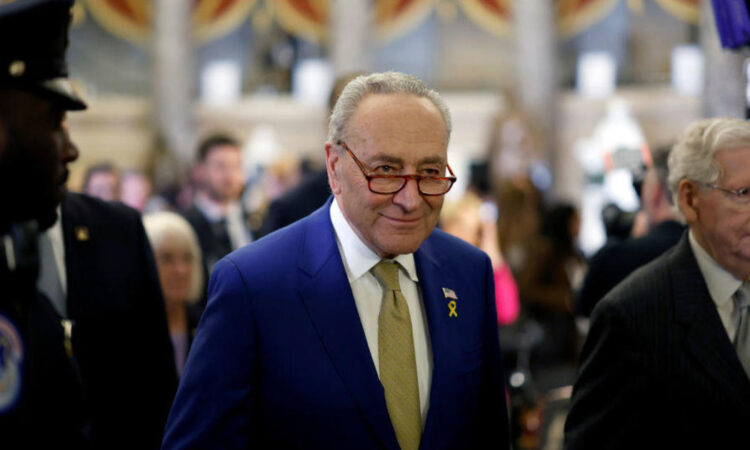
Washington — The Senate passed a six-bill package to fund parts of the federal government through September, narrowly avoiding a partial shutdown.
The upper chamber voted 75 to 22, sending the bill to President Biden’s desk before a midnight deadline. Mr. Biden signed the bill into law Saturday.
Republicans’ demands for amendment votes on immigration-related and other measures slowed its passage and threatened to push the final vote to Saturday, after funding lapsed.
“We have good news for the country,” Senate Majority Leader Chuck Schumer, a New York Democrat, said ahead of vote. “We will keep important programs funded for moms and kids, for veterans, for the environment, for housing and so much more. Because both sides cooperated today, we’ve taken a major step towards our goal of fully funding the government. Today’s bipartisan agreement gives us momentum and space to finish the remaining appropriation bills by March 22.”
Ting Shen/Bloomberg via Getty Images
The House passed the package Wednesday, with Democrats providing a majority of the votes needed to get it over the finish line. Conservatives held firm in their opposition to all of the recent funding extensions that lacked their preferred spending cuts and policy riders.
In a statement from the White House Friday night, the Office of Management and Budget said that it had “ceased shutdown preparations because Congress has passed the relevant appropriations and the President will sign the bill shortly. Because obligations of federal funds are incurred and tracked on a daily basis, and the President will sign the bill tomorrow, agencies will not shut down and may continue their normal operations tomorrow.”
The latest measure to keep the government operating covers agriculture, energy and the environment, housing, transportation, veterans and the Justice Department through the end of the fiscal year on Sept. 30.
Congress has another two weeks, until March 22, to pass the six remaining spending bills to fully fund the government for the same timeframe. But getting the second package — which includes funding for the Defense, State and Homeland Security departments — through Congress is expected to be more contentious.
If lawmakers can get over that hurdle, it would resolve a spending fight that has repeatedly pushed the government to the brink of a shutdown since last fall, and allow Congress to shift its focus to approving next year’s appropriations bills.
“We are on target and on track to meet that deadline,” Connecticut Rep. Rosa DeLauro, the top Democrat on the House Appropriations Committee, said Wednesday of the March 22 deadline.
DeLauro said the bills “are in various stages of progress.”
The current six-bill package includes cuts to the FBI, the Environmental Protection Agency and the Bureau of Alcohol, Tobacco, Firearms and Explosives, which were celebrated by House Speaker Mike Johnson, a Louisiana Republican. But the conservative House Freedom Caucus said it “punts on nearly every single Republican policy priority.”
Democrats were able to fend off restrictions on abortion access sought by Republicans and secured investments in infrastructure and programs for veterans, while also fully funding a nutrition program for low-income women, infants and children, known as WIC.
Alan He contributed reporting.






